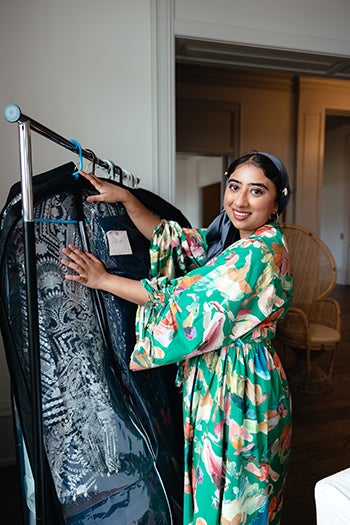What does one get when they combine a love for fashion, a passion for sustainability, and an enriching experience in the School of Social Sciences’ Master of Global Affairs (MGA) program? Hawá Patel, ‘20, has the answer.
Born in Spring, Texas, Patel is a first-generation American of Indian and Pakistani descent with strong ties to her family and culture. Prior to enrolling in the MGA program, she attended law school, which she quickly learned was not the right fit. Patel aspired to a creative career path that would combine her background in international affairs and her love of fashion. The MGA program enabled her to bring her unique backgrounds together and further explore what a career in global sustainability could entail.
“I was accepted into the program, and I was met with so much support to explore research that interested me,” said Patel. “My research combined subjects I learned about in class and skills I gained from my internships. I really valued the freedom I was given and the support I received.”
Patel currently works for Neiman Marcus Group as a supervisor of trade and social compliance. She credits the MGA program for providing her with a solid foundation for her career and for equipping her with the ability to critically assess her work with a global outlook.
“At Rice, I took classes on foreign policy and the Middle East, and I researched American diplomacy,” said Patel. “All these experiences prepared me for the workplace. When I started my job, I thought, ‘I’ve got this.’”

Since graduation, Patel has launched Api’s Closet – a sustainable clothing rental company that specializes in luxury pieces for attendees to wear at South Asian weddings. Api is the Urdu term for older sister.
“Where do you go when you have nothing to wear?” Patel asked. She answered, “You raid your sister's closet!”
Pakistani and Indian weddings, Patel explained, consist of at least five events where guests wear different colored, traditional, intricate outfits.
“Your closet gets stuck with all these beautiful pieces that you may never wear again, and your wallet gets lighter because these pieces are not cheap,” said Patel. “We provide people with a sustainable solution, offering outfits for every event in the wedding.”
If users aren’t familiar with the type of garments needed for South Asian weddings, Api’s Closet makes it easy to navigate. Clients rent their pieces, sourced out by a woman in Pakistan, for five days and do not need to wash or dry clean the clothing before returning them.
Api’s Closet reflects the mission of the School of Social Sciences, which aims to tackle society's greatest challenges with an unconventional vision toward shaping a future in which everyone can thrive. The heart of Api’s Closet is Patel’s goal of tackling the prevalent environmental issue of clothing waste through innovative means.
“If you love something,” said Patel, “you can't be a part of its downfall. I’m going to do what I love and work to fix the problem.”
When asked what advice she would give to students considering applying for the MGA program, Patel said, “If you are passionate about something, and you want to take it to a global level, then go ahead and apply right now. You never know what doors are going to open. I never expected myself to be doing this in a million years.”
Patel reflects fondly upon her time at Rice and attributes many of her successes to the valuable experience she received in the MGA program.
"I loved my time at Rice. It was beautiful. It was challenging. And it changed my life for the better."
Rice University’s Master of Global Affairs is a two-year professional master’s degree co-sponsored by the James A. Baker, III Institute for Public Policy and the School of Social Sciences. Our location in the heart of Houston, Texas provides the perfect setting for students to engage with global energy companies, Fortune 500 organizations, local and Federal government entities, and international nonprofits.

